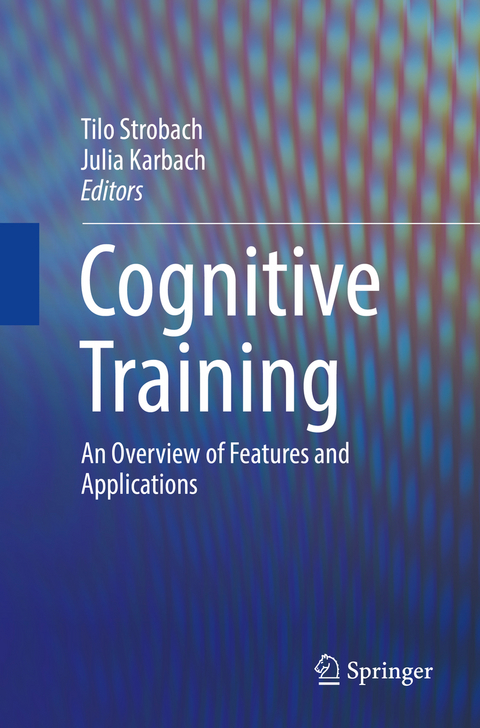
Cognitive Training
Springer International Publishing (Verlag)
978-3-319-93218-7 (ISBN)
This book offers a comprehensive overview of empirical findings and methodological approaches of cognitive training research in different cognitive domains (memory, executive functions, etc.), types of training (working memory training, video game training, physical training, etc.), age groups (from children to young and older adults), target populations (children with developmental disorders, aging workers, MCI patients etc.), settings (laboratory-based studies, applied studies in clinical and educational settings), and methodological approaches (behavioral studies, neuroscientific studies). Chapters feature theoretical models that describe the mechanisms underlying training-induced cognitive and neural changes.
Cognitive Training: An Overview of Features and Applications will be of interest to researchers, practitioners, students, and professors in the fields of psychology and neuroscience.
Tilo Strobach finished his doctoral degree at Humboldt University Berlin. After that he held post-doc positions at this university and at LMU Munich. Currently, Tilo Strobach is full professor for cognitive psychology at the Medical School Hamburg. His research focuses on the analysis of cognitive plasticity as a result of training (e.g., video-game, dual-task, working memory, and task switching training) and cognitive aging. Furthermore, he aims at specifying the cognitive processing architecture in situations that demand executive functions as well as the perception of complex objects. Julia Karbach is a developmental cognitive psychologist holding a PhD in Psychology from Saarland University. She currently serves as full professor at Goethe-University Frankfurt. Her research interests include neurocognitive development and plasticity across the lifespan, psychocardiology, and the prediction of academic achievement from primary to tertiary education. Her work has been published in numerous leading peer-reviewed international journals.
Chapter 1. Introduction.- Part I: Basic Concepts and Methodology .- Chapter 2. Methods and Designs.- Chapter 3. Theoretical Models of Training and Transfer Effects.- Part II: Plasticity in Different Age Groups .- Chapter 4. Childhood and Adolescence.- Chapter 5. Adult Lifespan.- Part III: Plasticity of Different Cognitive Domains .- Chapter 6. Working Memory.- Chapter 7. Episodic Memory.- Chapter 8. Prospective Memory.- Chapter 9. Executive Functions.- Part IV: Multidomain Trainings .- Chapter 10. Action Video-Game Training and Its Effects on Perception and Attentional Control.- Chapter 11. Video-Game Training and Effects on Executive Functions.- Chapter 12. Mindfulness and Meditation Training.- Chapter 13. Music Training.- Chapter 14. Physical Training.- Part V: Cognitive Training in Applied Contexts .- Chapter 15. Individual Difference and Motivational Effects.- Chapter 16. Educational Application of Working-Memory Training.- Chapter 17. Changes of Electrical Brain Activity After Cognitive Training.- Chapter 18. Cognitive Training in Mild Cognitive Impairment.- Part VI: Outlook .- Chapter 19. The Future of Cognitive Training.
| Erscheinungsdatum | 11.06.2018 |
|---|---|
| Zusatzinfo | XI, 211 p. 6 illus., 2 illus. in color. |
| Verlagsort | Cham |
| Sprache | englisch |
| Maße | 155 x 235 mm |
| Gewicht | 349 g |
| Themenwelt | Geisteswissenschaften ► Psychologie ► Allgemeine Psychologie |
| Schlagworte | Clinical application of cognitive training • Educational application of cognitive training • Individual differences in training-induced benefit • Individual differences in training-induced benefits • Mechanisms of cognitive training effects • Motivational effects on cognitive training benefit • Motivational effects on cognitive training benefits • Replicability of cognitive training studies |
| ISBN-10 | 3-319-93218-7 / 3319932187 |
| ISBN-13 | 978-3-319-93218-7 / 9783319932187 |
| Zustand | Neuware |
| Informationen gemäß Produktsicherheitsverordnung (GPSR) | |
| Haben Sie eine Frage zum Produkt? |
aus dem Bereich


